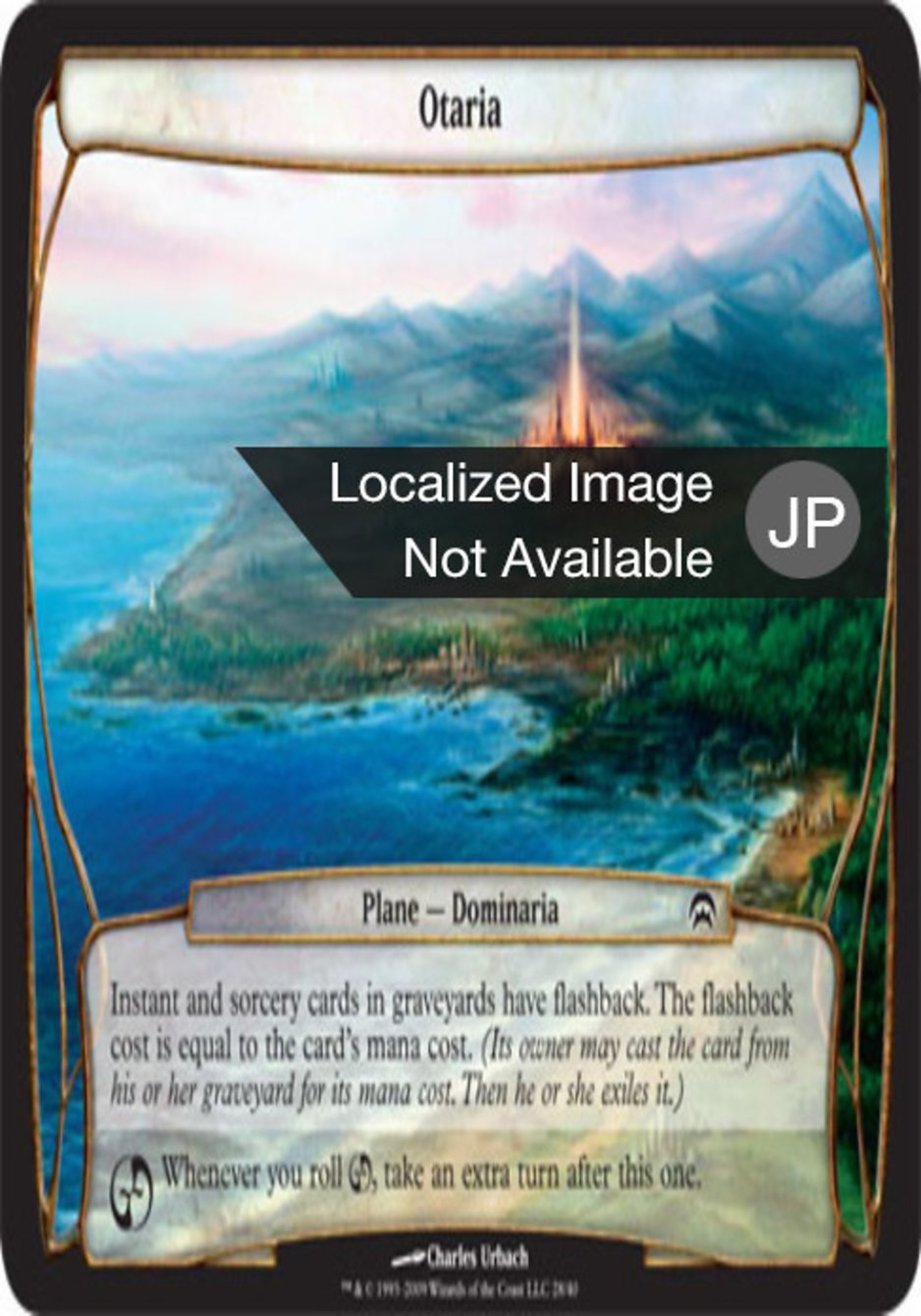
オタリア
次元 — ドミナリア
墓地にあるインスタント・カードとソーサリー・カードはフラッシュバックを持つ。 そのフラッシュバック・コストは、そのカード自身のマナ・コストに等しい。 (そのカードのオーナーはそれを自分の墓地からそれのマナ・コストでプレイしてもよい。その後、そのプレイヤーはそれを追放する。)
あなたがchaosを出すたび、このターンに続いて追加の1ターンを行う。
Illustrated by Charles Urbach
Not Legal This version of this card is oversized with a non-standard Magic back. It is not legal for constructed play.
Toolbox
Buy This Card
Notes and Rules Information for オタリア:
- Only the English version of a Magic card receives Oracle updates and errata. View this card in English. (Scryfall note)
- A plane card is treated as if its text box included "When you roll {PW}, put this card on the bottom of its owner's planar deck face down, then move the top card of your planar deck off that planar deck and turn it face up." This is called the "planeswalking ability." (2009-10-01)
- A face-up plane card that's turned face down becomes a new object with no relation to its previous existence. In particular, it loses all counters it may have had. (2009-10-01)
- The controller of a face-up plane card is the player designated as the "planar controller." Normally, the planar controller is whoever the active player is. However, if the current planar controller would leave the game, instead the next player in turn order that wouldn't leave the game becomes the planar controller, then the old planar controller leaves the game. The new planar controller retains that designation until they leave the game or a different player becomes the active player, whichever comes first. (2009-10-01)
- If an ability of a plane refers to "you," it's referring to whoever the plane's controller is at the time, not to the player that started the game with that plane card in their deck. Many abilities of plane cards affect all players, while many others affect only the planar controller, so read each ability carefully. (2009-10-01)
- If you roll {CHAOS} multiple times in the same turn, you'll take that many extra turns after this one. (2009-10-01)
- "Flashback [cost]" means "You may cast this card from your graveyard by paying [cost] rather than paying its mana cost" and "If the flashback cost was paid, exile this card instead of putting it anywhere else any time it would leave the stack." (2021-03-19)
- You must still follow any timing restrictions and permissions, including those based on the card's type. For instance, you can cast a sorcery using flashback only when you could normally cast a sorcery. (2021-03-19)
- To determine the total cost of a spell, start with the mana cost or alternative cost (such as a flashback cost) you're paying, add any cost increases, then apply any cost reductions. The mana value of the spell is determined only by its mana cost, no matter what the total cost to cast the spell was. (2021-03-19)
- A spell cast using flashback will always be exiled afterward, whether it resolves, is countered, or leaves the stack in some other way. (2021-03-19)
- You can cast a spell using flashback even if it was somehow put into your graveyard without having been cast. (2021-03-19)
- If a card with flashback is put into your graveyard during your turn, you can cast it if it's legal to do so before any other player can take any actions. (2021-03-19)
- If you cast an instant or sorcery with {X} in its mana cost this way, you still choose the value of X as part of casting the spell and pay that cost. (2021-03-19)
- If you cast a spell with flashback, you can't pay any alternative costs such as overload costs. You can pay additional costs such as kicker costs. If the spell has any mandatory additional costs, you must pay those to cast the spell with flashback. (2021-03-19)
- If a card has multiple instances of flashback, you may choose any of its flashback costs to pay. (2021-03-19)
- If a split card gains flashback, you pay only the cost of the half you're casting. (2021-03-19)
- If a card with no mana cost gains flashback, it has no flashback cost. It can't be cast this way. (2021-03-19)